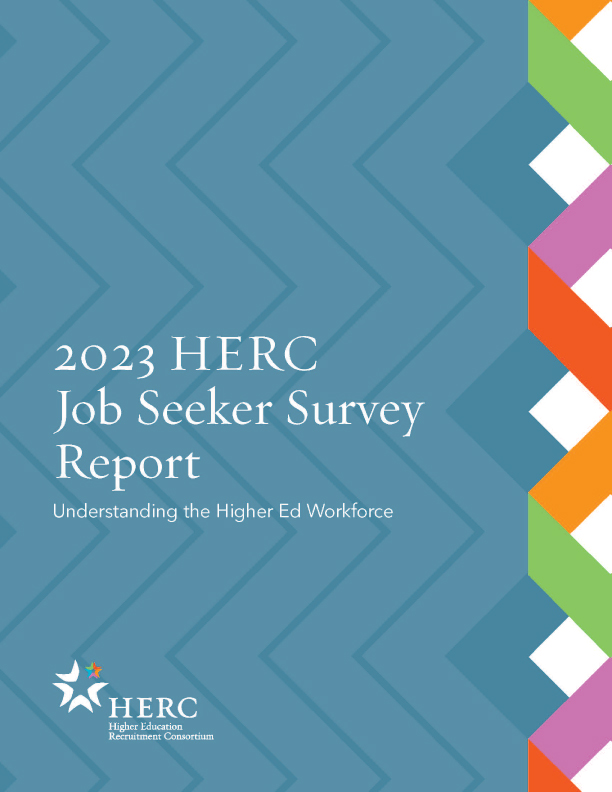Higher Ed Job Seekers Value Supportive Leadership, Healthy Workplace Cultures; Highly Willing to Relocate
New Report Highlights Increasing Competition for Stagnant Higher Ed Candidate Pool
SAN FRANCISCO, CA – As recruitment and retention remain top of mind for higher education employers, a new report from the Higher Education Recruitment Consortium (HERC) provides a timely pulse check on today’s higher ed job seekers. [The full report is available to HERC members. If you are interested in accessing the report, please contact Marcia Silva – see info at the bottom.]
The new publication, “2023 HERC Job Seeker Survey Report: Understanding the Higher Ed Workforce,” shares key takeaways and recommended actions for human resources, academic affairs, and diversity leaders to improve their efforts to find, select, and retain staff and faculty.
“We know from our survey that current and prospective higher ed employees want a supportive workplace that values and rewards their contributions,” said Jessica Wise, HERC Co-Executive Director. “Higher ed employers must be responsive to these needs and this report provides data-informed insights to identify new interventions and make workforce planning decisions.”
The report provides insights on the current job seeker landscape, factors affecting employee retention, and the value of diversity and inclusion workplace efforts. Some of the trends are consistent year over year, such as higher ed job seekers finding remote jobs attractive, but new data has emerged that could help inform how higher education institutions conduct their recruitment and retention activities and where to invest their time and resources.
Highlights from the report findings include:
- Higher ed job seekers are looking across industries. Of the 87% of survey respondents that noted they were actively or passively job searching, 65% were not exclusively seeking opportunities in higher education. Another revealing datapoint is that only 26% of 22-32-year-olds were focused on higher ed jobs only.
- The higher education workforce does not feel connected and valued. When asked if they agree or disagree with this statement, “I feel connected and valued at my current workplace,” 53% agreed, while 31% disagreed and 15% were unsure. When looking at what sector these respondents currently worked in, those working in colleges or universities had the lowest percentage agreeing with the statement (49%).
- Diversity, equity, and inclusion remain a top priority. The majority of minority & underrepresented (85%) and white (77%) respondents noted that diversity and inclusion policies were important to them. Having diverse leadership, addressing diversity and inclusion issues in the hiring process, and having a diverse staff currently are the top three indicators of an employer’s commitment to DEI according to minority and underrepresented respondents.
- Job seekers are open to moving for a job opportunity. Nearly half (47%) of survey respondents are willing to relocate for a new job. Of those open to relocating, a substantial percentage of job seekers (38%) are willing to move anywhere in the United States for a new job.
“For a variety of reasons, higher ed employers have had to reassess their policies and programs that attract and keep a diverse workforce,” said Wise. “Our ability to reach and engage job seekers gives us unique access to insights from this talent community.”
ABOUT THE HIGHER EDUCATION RECRUITMENT CONSORTIUM: The Higher Education Recruitment Consortium (HERC) is a nonprofit consortium committed to advancing diversity, equity, and inclusion in the higher education workforce. With over 700 colleges, universities, hospitals, research labs, government agencies, and related organizations, HERC works to ensure member institutions are sites of belonging, where all faculty and staff can thrive. HERC provides resources, networking, and outreach programs to attract, hire, and retain a diverse and qualified workforce.
CONTACT: Marcia Silva, Higher Education Recruitment Consortium, marcia@hercjobs.org, 650-417-3193

